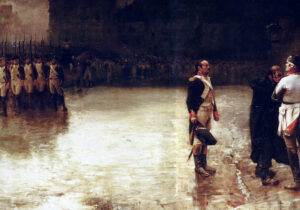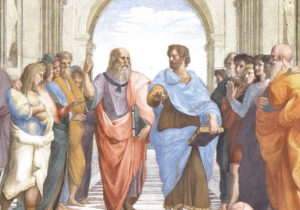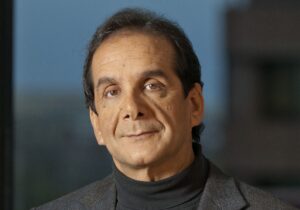Most colleges and universities, including Christian ones, require at least one modern International Relations (IR) theory class for a degree in political science. Baylor University, my alma mater, is no exception. Yet today, I question the value of teaching students a series of IR theories that claim to be the best explanatory frameworks in existence—and which fail to predict anything of significance in the real world. Just as with critical theory in the humanities, the implicit message these theories convey to students is one of nihilism.
A cursory glance at the IR field gives little indication of this. Most IR educators and their students view their theories as meaningful and expect learning them to improve their understanding of politics, as well as their ability to serve the international community. But upon closer review, many of these theories appear to be factories of useless fictions.
Consider foreign policy realism, the most prominent IR theory. It assumes that political actors are consistently motivated by rational self-interest, as defined by coldly calculated cost-benefit analyses. But thoughtful political scientists admit this assumption is inaccurate. They acknowledge people and states make all kinds of decisions with no reference to purportedly objective rationality.1 Reading between the lines, it seems IR educators and students are trying to draw wisdom from a theory they know to be false.
This is not unique to foreign policy realism, but typical of IR generally. In his 2017 book on the field, meta-theorist Stephen McGlinchey describes IR theories as “porous, complex and evolving things that give us a unique insight into the structure of collective thought,” but not into “universal truths about politics.”2 At Baylor, my instructors frequently echoed McGlinchey, reminding me that the ideas we studied “weren’t technically true.”
Such avowals may be commonplace across the social studies, but they do not do exculpate the teaching of such theories. Why did my instructors ask me to imbibe ideas that no one fully believes in? If my father, a geologist, prefaced one of his scientific articles by stating that his theories “weren’t technically true,” he would be laughed out of the academy. Why do the same rules not apply to IR? After all, “science” is still in the department name.
I have yet to encounter any more than two answers to these questions. The first is offered by McGlinchey in his book, who, referencing IR scholar Steve Smith, writes: “‘[T]he option of non-theoretical accounts of the world is simply not available.’ As such, you need to familiarize yourself with what theory is, how it works and how it shapes the way you see the world.”3 This seems reasonable, except that for McGlinchey, “theoretical” means “ideological” as Eric Voegelin would use the term: denoting a system of mental constructs rather than logical deductions from reality.4 In other words, for McGlinchey, accuracy is unattainable, and we should content ourselves with potentially baseless paradigms. The author explicitly states: “It is not important whether IR theories are true or not.”5 Most orthodox Christians would, and should, reject this postmodern answer out of hand.
The second answer, the one my instructors at Baylor offered, is that modern IR theories are best understood as utilitarian “lenses.” Offering a distorted picture of reality, they may not be applicable to all real-world politics. But in the right circumstances, their distortions can prove useful, clarifying political issues as the lenses of magnifying glasses clarify far-off views by distorting paths of light.
This answer is more defensible than McGlinchey’s, because there is precedent for such “theoretical idealization” in the physical sciences. Elementary physics courses, for instance, often omit friction to help students more easily grasp the interplay of force and mass. Even so, the comparison stops short. While hypotheses in the physical sciences are abstract, they are also true. Force, abstracted from factors like friction, really does equal mass times acceleration. Political agents, on the other hand, do not always act on rational self-interest, as foreign policy realism asserts, no matter what factors they are abstracted from. In short, scientific theories are provisionally distortionary, whereas modern IR theories are distortionary to their core.
This does not bother a thinker like McGlinchey, who would subordinate IR to critical theory. But it should bother IR educators and students who seek to better themselves and their communities by their studies. Why should they expect enlightenment from embracing and acting on falsehoods? Why should they expect utility from that, either?
It is worth noting that, despite their purported practicality, modern IR theories appear to exert little influence over politics. U.S. policymakers regularly deride or ignore them as the products of “an irrelevant ivory tower.”6 Meanwhile, even IR superstars like Stephen Walt acknowledge “[p]olicy relevance is simply not a criterion that the [IR] academy values.”7 We could blame these shortcomings on politicians’ obtuseness or universities’ “organizational culture.”8 But might the culprit simply be the fact that IR’s “useful fictions” are, in the end, not that useful?
Political scientist David Lake thinks so. In a 2011 article, he suggests that by requiring their adherents to suspend certain truths indefinitely, modern IR theories have “reified” into religious “sects.” These sects funnel advanced IR students into purely self-referential corners of the academy, each devoted to a particular “ism.” When those students become educators, their ideological training continues to sequester them from history, society, and politics. Eventually, all their ability to transcend the “isms” and comment constructively on real-world politics atrophies.9
This should be disturbing. It should be especially disturbing to Christian educators, who are ostensibly committed to purveying truth and empowering their students to do good. Encouraging students to adopt ideas that are both false and useless is inconsistent with these goals. If modern IR theories are really useless fictions, then Christian schools must begin rethinking their place in IR curricula. Otherwise, they risk leading their students into nihilism.
To anyone who considers this far-fetched, I commend the journalist Malcolm Kyeyune’s 2023 article on foreign policy realism. Kyeyune ascribes to realism, which he describes as “truth.” But as a keen observer of politics, he also recognizes that realism does not account for what actually animates society: a combination of rational, a-rational, and irrational motivations that he calls “magic.” This recognition results in a cognitive dissonance that pushes Kyeyune to metaphysical despondency. That “truth isn’t magic, and magic isn’t truth,” he laments, is all part of the “deeply appealing and naturally repellant…story of human greatness, human potential, and human brilliance, and how all those things came to naught in the end.”10
Kyeyune despairs because the IR theory he believes is fundamentally opposed to reality. In contrast, Christians have a long tradition of theorizing about IR in concert with reality, with just war theory being the primary example. This theory is different from the likes of foreign policy realism in that it is based on a substantive anthropology, rather than ideological—and frequently inaccurate—political assumptions. It is time Christian schools draw on their own IR tradition and evaluate modern IR theories in light of it. Otherwise, they will do a disservice to their students, who are interested in learning truth, not fancy.
- Brian C. Schmidt and Colin Wight. “Rationalism and the ‘Rational Actor Assumption’ in Realist International Relations Theory.” Journal of International Political Theory, 19(2), 158-182. ↩︎
- Stephen McGlinchey, Rosie Walters, and Christian Scheinpflug. International Relations Theory. E-International Relations Publishing: 2017, 150. ↩︎
- McGlinchey, Walters, and Scheinpflug, 151. ↩︎
- Ibid, 149. ↩︎
- Ibid, 151. ↩︎
- David Newsom, qtd. by Sebastian Rosato and John Schuessler. “A Realist Foreign Policy for the United States.” Perspectives on Politics, 9(4), 803. ↩︎
- Stephen Walt, qtd. by Rosato and Schuessler, 803. ↩︎
- Bruce Jentleson and Ely Ratner, qtd. by Rosato and Schuessler, 803. ↩︎
- David Lake. “Theory Is Dead, Long Live Theory: The End of the Great Debates and the Rise of Eclecticism in International Relations.” European Journal of International Relations, 19(3), 567-587. ↩︎
- Malcolm Kyeyune, “The Tragedy of Foreign-Policy Realism.” Compact. https://www.compactmag.com/article/the-tragedy-of-foreign-policy-realism/. ↩︎






